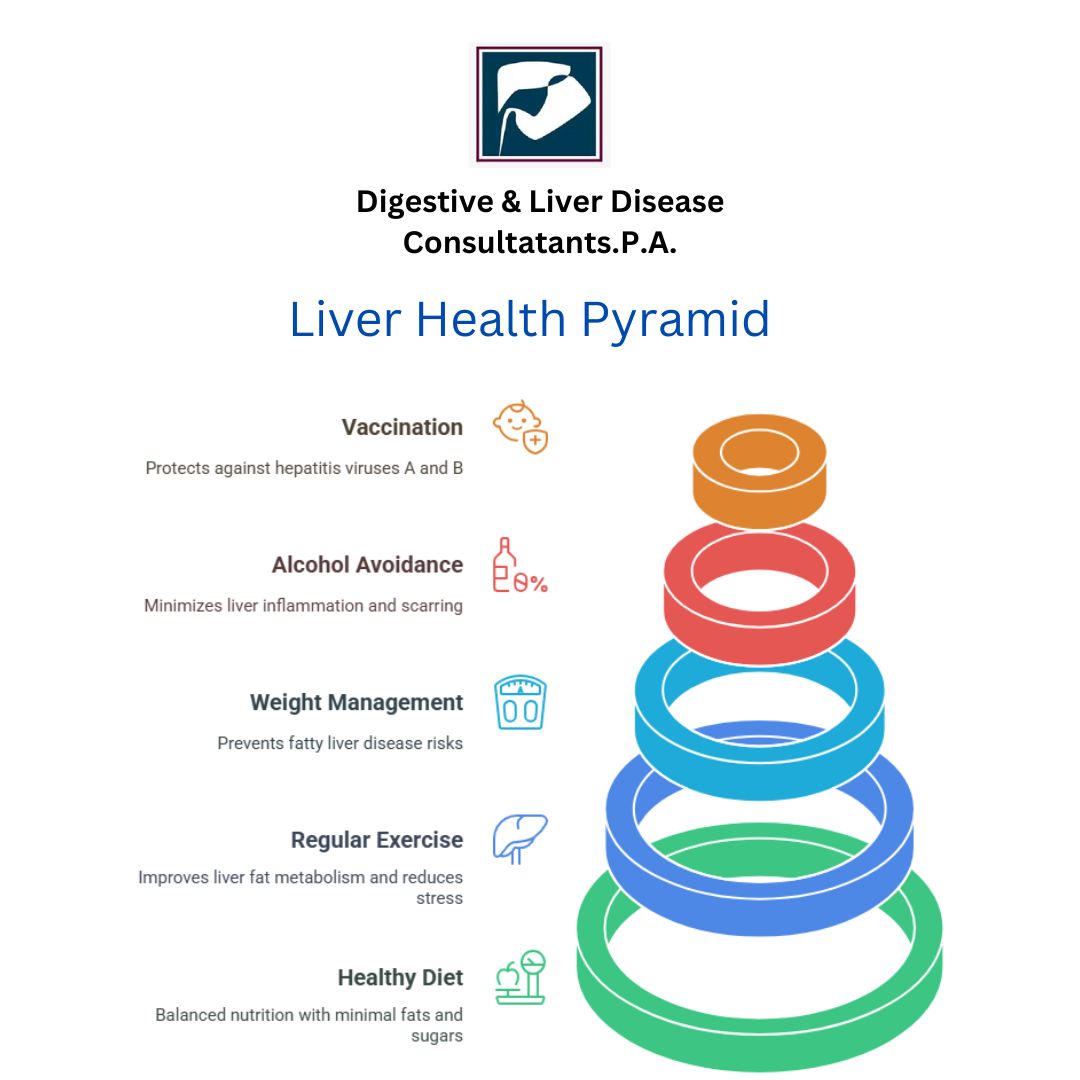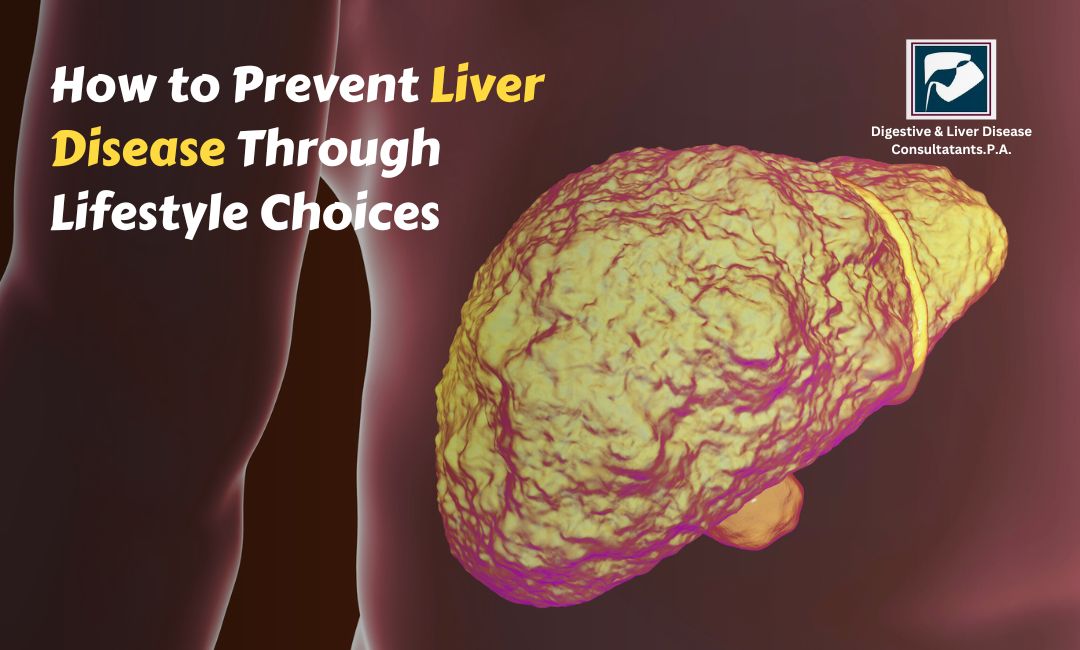The liver is one of the most important organs in our body, playing a vital role in detoxifying harmful substances, producing proteins, and helping in digestion. However, many people overlook the health of their liver until they face serious issues like liver disease. Liver diseases can be caused by factors such as viral infections, alcohol abuse, poor diet, or even genetic conditions. The good news is that many liver diseases can be prevented or managed with the right lifestyle choices.
At Digestive & Liver Disease Consultants, P.A., we emphasise the importance of taking proactive steps to ensure your liver stays healthy. In this blog, we will discuss key lifestyle changes and habits that can help you prevent liver disease and maintain overall liver health.
1. Maintain a Healthy Diet
A healthy diet is essential for maintaining liver function and preventing liver disease. The liver is responsible for processing the food and nutrients you consume, so it's important to fuel it with nutritious foods.
Eat plenty of fruits and vegetables: These are rich in antioxidants and other nutrients that help protect the liver from damage. Leafy greens, cruciferous vegetables like broccoli, and fruits like berries and citrus fruits are excellent choices.
Choose lean proteins: Opt for lean meats, fish, eggs, and plant-based proteins such as legumes and tofu. Protein helps your liver repair and regenerate cells.
Incorporate healthy fats: Unsaturated fats found in foods like olive oil, nuts, and avocados are better for liver health than saturated fats.
Limit sugar and refined carbohydrates: High sugar intake and processed carbs can lead to fatty liver disease, which can eventually result in cirrhosis. Reduce consumption of sugary drinks, sweets, and processed foods.
Avoid excessive salt: Too much salt can lead to high blood pressure, which can harm the liver over time.
A balanced diet rich in fiber, healthy fats, and lean proteins will support your liver's detoxification process and help reduce the risk of liver disease.

2. Exercise Regularly
Regular physical activity is another important factor in preventing liver disease. Exercise helps maintain a healthy weight and prevents obesity, which is a major risk factor for liver conditions such as fatty liver disease. Additionally, regular exercise improves blood circulation, boosts metabolism, and supports overall health.
Aim for at least 150 minutes of moderate-intensity exercise per week. Activities such as brisk walking, cycling, swimming, or jogging are great options.
Include strength training exercises: Incorporating weightlifting or resistance exercises into your routine can improve muscle mass, increase metabolism, and promote liver health.
Regular exercise not only helps keep your liver healthy but also benefits your heart, lungs, and mental well-being. It’s an essential part of a healthy lifestyle.
3. Avoid Excessive Alcohol Consumption
Excessive alcohol consumption is one of the leading causes of liver disease. Chronic heavy drinking can lead to alcoholic fatty liver disease, cirrhosis, and liver failure. It's important to drink alcohol in moderation or avoid it altogether to reduce the risk of liver damage.
Moderate alcohol consumption: For men, this means up to two drinks per day, and for women, it means up to one drink per day.
Give your liver a break: Consider taking several alcohol-free days each week to give your liver time to recover.
If you are concerned about your alcohol consumption, speak with your healthcare provider for advice and support in managing your drinking habits.
4. Stay Hydrated
Staying well-hydrated is vital for your liver and overall health. Water helps flush toxins from your body, supports liver function, and helps digestion. Aim to drink at least 8 glasses of water a day to stay properly hydrated. Avoid sugary or artificially sweetened beverages that can contribute to liver damage over time.
Drink water regularly: Carry a water bottle with you throughout the day as a reminder to stay hydrated.
Limit sugary drinks: Soda, sweetened juices, and energy drinks can contribute to weight gain and fatty liver disease.
Drinking enough water is one of the simplest and most effective ways to keep your liver and body functioning at their best.
5. Be Cautious with Medications
Some medications, both prescription and over-the-counter, can be harmful to the liver if taken in excess or for prolonged periods. It's important to take medications only as directed by your doctor and avoid self-medicating.
Avoid over-the-counter pain relievers: Common pain relievers such as acetaminophen (Tylenol) can cause liver damage if taken in large doses. Always follow dosage recommendations.
Talk to your doctor: If you need to take long-term medication, consult your doctor about any potential risks to your liver and whether any alternative medications are available.
By following your doctor's advice and using medications carefully, you can avoid unnecessary harm to your liver.
6. Get Vaccinated
Some liver diseases are caused by viruses, such as hepatitis B and hepatitis C. Fortunately, vaccines are available to protect against hepatitis B. Hepatitis C, on the other hand, has no vaccine, but early detection and treatment can prevent long-term liver damage.
Get the hepatitis B vaccine: If you are at risk of contracting hepatitis B, speak to your doctor about getting vaccinated.
Screen for hepatitis C: If you have risk factors such as a history of intravenous drug use or a blood transfusion before 1992, consider getting tested for hepatitis C.
Prevention and early detection of viral hepatitis can significantly reduce the risk of liver disease.
7. Manage Your Weight
Maintaining a healthy weight is crucial in preventing liver diseases such as non-alcoholic fatty liver disease (NAFLD). Obesity increases the risk of liver inflammation and scarring, leading to conditions like cirrhosis.
- Achieve a healthy body mass index (BMI): Aim for a BMI between 18.5 and 24.9 for optimal liver health.
- Eat a balanced diet and exercise regularly to maintain a healthy weight.
If you are struggling with weight management, consult with a healthcare professional or nutritionist for personalized guidance.
8. Avoid Toxins
Certain environmental toxins and chemicals can cause liver damage. Pesticides, heavy metals, and industrial chemicals may contribute to liver disease. Always follow safety instructions when handling chemicals, and limit exposure to harmful substances.
- Wear protective gear when working with hazardous materials.
- Avoid inhaling fumes: If you work in an environment where you're exposed to chemicals or toxins, wear a mask or respirator as recommended.
- Protecting yourself from toxins can significantly lower your risk of liver damage.
Conclusion
Preventing liver disease is possible by making healthy lifestyle choices that support liver function. A balanced diet, regular exercise, moderate alcohol consumption, staying hydrated, and avoiding unnecessary toxins are key to maintaining optimal liver health. It’s also essential to get vaccinated and manage any underlying health conditions to reduce your risk of liver disease.
Suffering from liver issues or worried about your test results?
The specialists at Digestive & Liver Disease Consultants, P.A., are ready to help you. Schedule a consultation today and take the first step toward better liver health.






